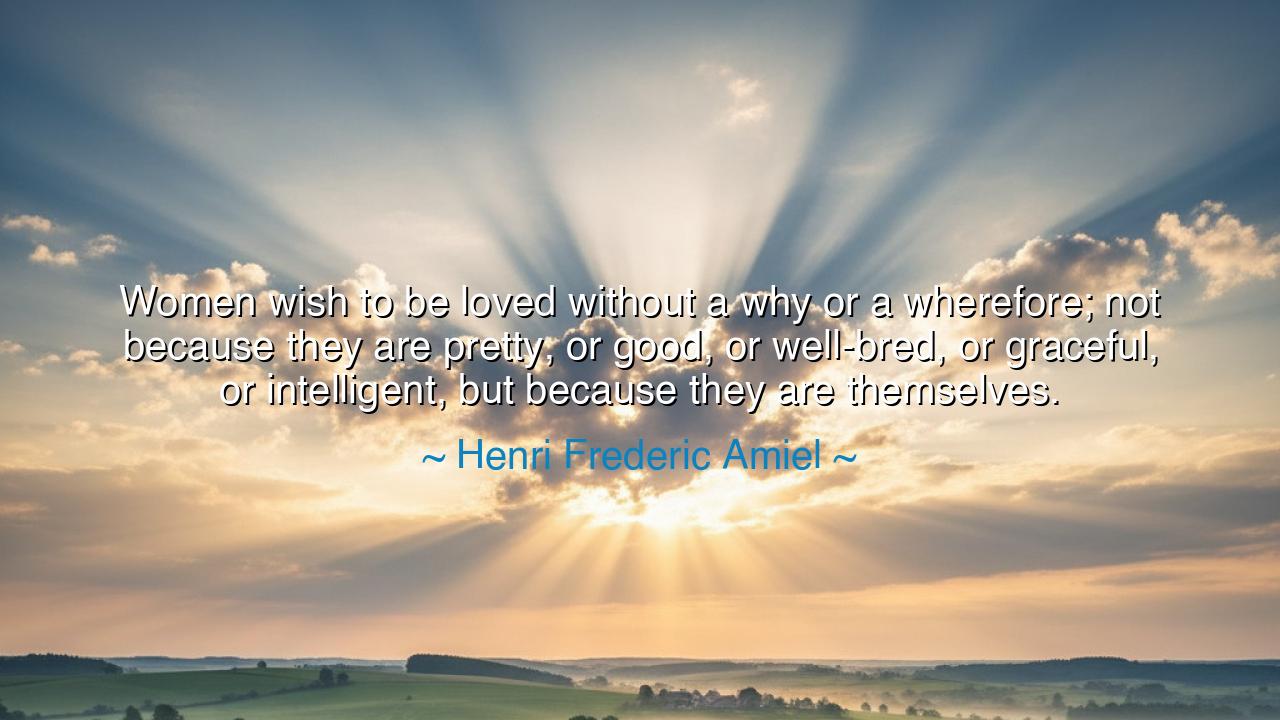
Women wish to be loved without a why or a wherefore; not because
Women wish to be loved without a why or a wherefore; not because they are pretty, or good, or well-bred, or graceful, or intelligent, but because they are themselves.






Hear the tender and piercing words of Henri Frédéric Amiel, the philosopher of the soul, who wrote: “Women wish to be loved without a why or a wherefore; not because they are pretty, or good, or well-bred, or graceful, or intelligent, but because they are themselves.” These words echo through the corridors of time, for they speak to the deepest longing of every human heart: to be cherished not for the adornments of circumstance, but for the essence of being.
The origin of this saying lies in Amiel’s meditations on love and human nature, penned in his journals in the nineteenth century. A man often plagued by melancholy and self-reflection, he discerned a truth that remains unchanging: that conditional affection, tied to fleeting qualities, cannot satisfy the soul. Women, he observed, carried a yearning that was both simple and profound—to be embraced without measure, without calculation, without cause beyond the fact of their existence. This was not vanity, but the desire for love that affirms the eternal rather than the perishable.
History gives us striking examples of this truth. Consider Queen Victoria, whose love for Prince Albert transcended his titles or intellect. Her devotion was not grounded in his crown, nor in his accomplishments, but in the simple reality of himself. When he died, she mourned not the loss of a partner in politics, nor of a handsome figure at court, but of the man she had loved without condition. Her grief revealed the essence of Amiel’s words: that the heart longs to be seen and cherished beyond all external trappings.
The deeper meaning of Amiel’s reflection is that all qualities—beauty, grace, intelligence—are fragile. Time will erode them, circumstances will alter them, fortune will strip them away. To love for these reasons alone is to build a temple upon shifting sands. But to love someone simply for who they are is to build upon bedrock. It is to say: even when beauty fades, even when wit dulls, even when strength fails, still I love you. For love then becomes eternal, rooted in the unchanging dignity of the soul.
The lesson for us is clear: seek love that is unconditional, and give love that is unconditional. Do not bind your affection to passing charms, for these are like blossoms that bloom and wither in a season. Instead, cultivate the deeper sight, the ability to cherish essence above appearance. Such love is rarer, but it is also stronger than death.
To the youth, I say: do not be seduced by the glitter of surface qualities alone; seek companions who will cherish you even when the world strips you bare. To lovers, I say: test your love by this question—would you still love if all else were gone, if beauty faded, if fortune vanished? If the answer is yes, then your love is true. To all, I say: remember that to be loved “without a why” is the deepest form of blessing, and to give such love is the highest form of offering.
Practical action lies before us: practice seeing beyond appearances. When you admire another, pause and look deeper—what is the essence of their being, apart from their talents or looks? Offer love, respect, and friendship that does not falter with circumstance. And when you receive such love, treasure it as one of the rarest gifts of existence.
Thus Amiel’s words endure: “Women wish to be loved … because they are themselves.” This is not a statement about women alone, but about the universal hunger of the soul. Let this teaching be passed down: that the truest love is unconditional, that it does not ask “why” or “wherefore,” but simply says, “I love you because you are.” For in such love lies eternity itself.






CV11TD - 32 - Chi Van
This quote implies a desire for love that transcends personal achievements or external factors, but how do we navigate relationships in a world where so much of our worth is still measured by tangible qualities? Can we really experience love without any 'why' or 'wherefore,' or are we always subconsciously influenced by the traits we admire or desire in others?
TNBui Tuyet Nhi
Amiel’s words capture the essence of unconditional love, but it raises an important question: can we truly love someone for who they are without recognizing their strengths or flaws? If we only love someone ‘because they are themselves,’ does that mean we overlook qualities that naturally draw us to people, such as intelligence or kindness?
TDNguyen Thuy Duong
This quote touches on a timeless desire for women to be loved for who they truly are, without conditions or judgments. But in a society where beauty and achievements are often emphasized, how do women (and men) foster relationships based on authentic connection rather than external validation? Can we truly embrace this kind of love in our everyday lives?
TDDoan Thi Thanh Dung
Henri Frederic Amiel’s quote reflects a deep longing for unconditional love, a love that isn’t tied to external qualities. But is it realistic to expect such love in a world that often values superficial traits? How can we ensure that we give and receive love that’s truly based on who we are, rather than on what we present to the world?